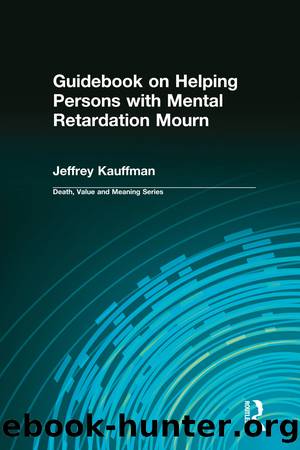Guidebook on Helping Persons with Mental Retardation Mourn by Kauffman Jeffrey;

Author:Kauffman, Jeffrey;
Language: eng
Format: epub
Publisher: Taylor & Francis Group
HANK
I met Hank, who lived in a supported independent living situation, about three years after his fatherâs death. He was referred for treatment because he had begun to break residential and workshop rules, to spend rent and food money impulsively, to act out sexually in self-destructive behaviors and to have fits of temper. These behaviors started just after his fatherâs death, but subsided soon after. There had been a series of recurrences of this behavior. The recent outbreak of these impulsive, disruptive, and angry actions was more intense, and staff, after a team discussion about Hankâs behaviors, thought that Hankâs behavioral disturbances were expressing continued grief over his fatherâs death, and referred him for an evaluation for grief therapy.
Hankâs relationship with his father was a complicated, powerful, disturbing undercurrent throughout his life. His father, an alcoholic prone to fits of rage, was emotionally abusive to Hank. Hankâs self-loathing was a legacy from his father, who violently cursed and insulted him. But, his father also spent close and very special time with Hank, sharing his love of the railroad with Hank. They rode the local commuter trains, and played with fatherâs model trains. These continued to be Hankâs favorite activities. Hank identified with his father, and was very connected to him. I asked Hank how he felt about his father. He said, âI hate my father and I love my father!â
A couple of months after the acting out that had precipitated treatment started, it stopped. This had been the pattern that had been occurring since his fatherâs death. When he stopped acting out he felt ashamed of himself for his bad behavior, and he was anxious that he would be punished. Hank begged for reconciliation with his residential support staff, and urged that he be forgiven for âmaking a mistake.â In the repentant aftermath of his acting out he was strongly engaged with staff and demonstrated a clear and confident sense of purpose. He was filled with the hope of reconciliation with staff, and was committed to make this happen. When we tried to understand Hankâs grief behavior we needed to look at both parts of the grief enactment, the destructive acting out and the reconciliation.
Hank behaviorally 1) acted out the inner turmoil of his grief and then 2) sought forgiveness. He enacted a self-destructive drama, felt the disapproval of staff, felt guilt and abandonment, and then sought reconciliation. His ambivalent relationship with his father compelled him to repeatedly enact this guilt drama. He was deeply ashamed of himself for being so bad and destructive and out of control, and sought to repair the damage he had done. The drama was motivated by a persistent guilt and shame. Each time he went through the acting behavior and the seeking reconciliation behavior, he got staff disapproval and then staff acceptance. Afterward, he did well for a while, then repeated the pattern. Why did he not succeed in really achieving reconciliation ?
I think that it is because the acting out was also an expression of anger at his father.
Download
This site does not store any files on its server. We only index and link to content provided by other sites. Please contact the content providers to delete copyright contents if any and email us, we'll remove relevant links or contents immediately.
Through Windows of Opportunity : A Neuroaffective Approach to Child Psychotherapy by Marianne Bentzen; Susan Hart(826)
Overcoming ADHD Without Medication : A Guidebook for Parents and Teachers by Children and Natural Psychology Association for Youth; Children The Association for Youth(779)
Out of the Mainstream: Helping the Children of Parents with a Mental Illness by Loshak Rosemary;(769)
The Noom Mindset by Noom(531)
Delphi Collected Works of Sigmund Freud (Illustrated) by Sigmund Freud(527)
The Psychology of Media and Politics by George Comstock & Erica Scharrer(435)
MANIPULATION & MIND CONTROL: The Persuasion Collection: Dark Psychology Secrets, Analyze & Influence People with Nlp. How to learn Reading Friends and Develop Body Language Skills. by ROBERT TOWER(421)
The 48 Laws of Mental Power: Overcoming Trauma and Building Mental Strength by Victor O. Carl(394)
It's nobody's fault: new hope and help for difficult children and their parents by Harold Koplewicz(383)
Behold the Monster by Jillian Lauren(383)
The Hypnotic Coach: A Conversational Hypnotherapy Tool Kit by Marion Jess(371)
Directions in Technical Writing and Communication by Gould Jay R.;(371)
Sigmund Freud by Janet Sayers;(357)
THE PSYCHOLOGY OF ENTREPRENEURSHIP; New Perspectives by Michael M. Gielnik; Melissa S. Cardon; Michael Frese(335)
Positive Psychology Across the Lifespan; An Existential Perspective by Piers Worth(321)
Mastering Flow: Perform Better, Experience More Joy, and Live a Happier Life by Nils Salzgeber(316)
The Modern Young Man's Guide to Manhood by Wayne Walker(310)
Mind Hacking Secrets and Unlimited Memory Power: 2 Books in 1: Learn How to Improve Your Memory & Develop Fast, Clear Thinking in 2 Weeks + 42 Brain Training Techniques & Memory Improvement Exercises by Sharp Scott(309)
Secrets of the Autistic Millionaire: Everything I know about Autism, ASD, and Asperger's that I wish I'd known back then... by David William Plummer(297)
